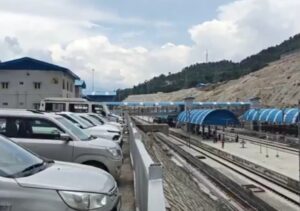Afghanistan’s Stance in an India-Pakistan War and Its Impact on Balochistan’s Instability
Samba Times Special

As there is a risk of war looming large between India & Pakistan, what would be the position or stance of Afghanistan in this war & how it effects situation in Balochistan, Samba Times has a critical dynamics on this. Afghanistan’s position if there is war between India-Pakistan is shaped by its geopolitical alignments, historical ties, and current internal dynamics. Based on available information, Afghanistan, under Taliban rule since August 2021, is likely to lean toward supporting India, primarily due to strained relations with Pakistan and longstanding diplomatic and developmental ties with India. However, this stance would be tempered by Afghanistan’s own instability and strategic priorities, which could exacerbate the chaos in Pakistan’s Balochistan province.
Afghanistan’s Likely Stance in an India-Pakistan War
- Alignment with India:
- Historical Ties: India has been a significant partner for Afghanistan, providing over $3 billion in development aid since 2001, including infrastructure projects, education, and healthcare. India built the Afghan parliament, major dams, and roads, fostering goodwill among Afghans.
- Tensions with Pakistan: Pakistan’s relations with the Taliban-led Afghan government have deteriorated since 2021. Pakistan’s support for the Taliban during the U.S. occupation (1996–2001 and post-2001 insurgency) created expectations of influence, but the Taliban have resisted Pakistan’s pressure to curb the Tehrik-e-Taliban Pakistan (TTP), a militant group attacking Pakistani forces from Afghan soil. Pakistan’s airstrikes in Afghanistan (e.g., December 2024 in Khost and Paktika) targeting TTP strongholds have further strained ties, prompting Taliban threats of retaliation.
- Taliban’s Strategic Calculus: The Taliban’s hostility toward Pakistan, coupled with India’s non-interference in Afghan affairs (unlike Pakistan’s historical meddling), makes India a more favorable partner. Posts on X suggest Afghan support for India in a potential war, citing shared animosity toward Pakistan.
- Evidence of Coordination: Pakistan has accused Afghanistan of harboring Baloch insurgents, including the Baloch Liberation Army (BLA), and facilitating attacks like the March 2025 Jaffar Express train hijacking. Intercepted communications allegedly show BLA fighters coordinating with Afghan-based handlers, suggesting Taliban acquiescence or tacit support.
- Constraints on Afghanistan’s Role:
- Internal Instability: Afghanistan faces its own challenges, including fighting ISIS-Khorasan (ISKP), economic collapse, and humanitarian crises. The Taliban’s focus on consolidating power limits their capacity to engage directly in an India-Pakistan conflict.
- Neutrality or Limited Involvement: While ideologically and strategically inclined toward India, the Taliban may avoid overt military involvement to prevent further destabilizing Afghanistan or inviting Pakistani retaliation. Instead, they could provide covert support, such as safe havens for anti-Pakistan groups like the TTP or BLA.
- Regional Balancing: Afghanistan must navigate relations with other powers like Iran, Russia, and China. Iran, which shares Balochistan’s cultural and historical ties, might support anti-Pakistan moves, while China, Pakistan’s ally, could pressure the Taliban to remain neutral.
Effects on Balochistan’s Chaos
The Balochistan insurgency, driven by ethnic Baloch separatists like the BLA, has intensified since the Taliban’s 2021 takeover, fueled by Pakistan’s internal weaknesses and regional dynamics. An India-Pakistan war, with Afghanistan’s likely pro-India tilt, would significantly worsen the chaos in Balochistan:
- Escalation of Insurgent Activity:
- Afghan Safe Havens: The Taliban’s strained ties with Pakistan and alleged tolerance of BLA operations from Afghan soil would likely increase if Pakistan is distracted by a war with India. Baloch insurgents could use Afghan territory to launch cross-border attacks, as seen in the 2025 train hijacking.
- TTP-BLA Coordination: Pakistan’s security establishment perceives growing collaboration between the TTP (Pashtun-dominated) and BLA (Baloch-led), both of which benefit from Afghan sanctuaries. A war would stretch Pakistan’s military, allowing these groups to exploit vulnerabilities in Balochistan.
- Access to Weapons: The BLA has reportedly acquired U.S. weapons left in Afghanistan post-2021, enhancing its capabilities. An India-Pakistan conflict could further loosen control over such arms flows, empowering insurgents.
- Pakistan’s Military Strain:
- Resource Diversion: Pakistan maintains significant forces on its eastern border with India. A war would divert resources from Balochistan, where the military already struggles to contain insurgents. This could embolden the BLA to seize highways or towns temporarily, as warned by Pakistani officials.
- Human Rights Backlash: Pakistan’s heavy-handed counterinsurgency tactics, including enforced disappearances (6,000 missing, 1,500 found dead since 2009), have radicalized Baloch youth. A war would likely intensify such measures, further fueling public support for the insurgency.
- Geopolitical Ripples:
- India’s Alleged Role: Pakistan accuses India of supporting Baloch insurgents via Afghanistan, a claim India denies. An India-Pakistan war could amplify these accusations, with Pakistan alleging Indian “defensive offense” strategies (e.g., Ajit Doval’s doctrine) to destabilize Balochistan. This could escalate cross-border tensions.
- Iran’s Involvement: Iran, wary of Baloch separatism spilling into its Sistan-Baluchestan province, might align with Afghanistan to pressure Pakistan, especially if anti-Iran groups like Jaish al-Adl operate from Pakistani Balochistan.
- China’s Concerns: Balochistan hosts key China-Pakistan Economic Corridor (CPEC) projects like Gwadar port, targeted by the BLA. A war-induced surge in instability could threaten Chinese interests, prompting Beijing to pressure Pakistan or even Afghanistan to curb militancy.
- Socioeconomic Fallout:
- Economic Disruption: Balochistan’s insurgency already disrupts CPEC and resource extraction. A war would halt development projects, deepen poverty (70% of Balochistan’s population is multidimensionally poor), and drive recruitment to insurgent groups.
- Ethnic Tensions: The BLA’s targeting of non-Baloch (e.g., Punjabi workers) could intensify in a chaotic war scenario, exacerbating ethnic divides and displacement.
Critical Perspective
While Pakistan’s narrative blames Afghanistan and India for Balochistan’s unrest, this oversimplifies the issue. The insurgency’s roots lie in decades of Baloch marginalization, economic neglect, and human rights abuses by the Pakistani state. Labeling insurgents as foreign proxies ignores their political grievances, which a militarized response (Pakistan’s preferred approach) fails to address. Afghanistan’s role, while significant due to cross-border militant sanctuaries, is secondary to Pakistan’s internal failures. An India-Pakistan war would exploit these fault lines, but the chaos in Balochistan predates and transcends external involvement.
Conclusion
Afghanistan would likely support India diplomatically or covertly in an India-Pakistan war, driven by its animosity toward Pakistan and historical ties with India. However, its direct involvement would be limited by internal challenges. This stance would worsen Balochistan’s chaos by empowering insurgents like the BLA, stretching Pakistan’s military, and amplifying regional tensions involving Iran and China. The insurgency’s escalation would deepen Balochistan’s socioeconomic and ethnic crises, with long-term implications for Pakistan’s stability.
Rahul Sambyal ✍️
Executive Editor
Samba Times
अफगानिस्तान का रुख भारत-पाकिस्तान युद्ध में और इसका बलूचिस्तान की अस्थिरता पर प्रभाव
अफगानिस्तान का रुख भारत-पाकिस्तान युद्ध में उसके भू-राजनीतिक गठबंधनों, ऐतिहासिक संबंधों और वर्तमान आंतरिक गतिशीलता से निर्धारित होता है। उपलब्ध जानकारी के आधार पर, अगस्त 2021 से तालिबान शासन के अधीन अफगानिस्तान, भारत के प्रति झुकाव रखने की संभावना है, मुख्य रूप से पाकिस्तान के साथ तनावपूर्ण संबंधों और भारत के साथ लंबे समय से चले आ रहे कूटनीतिक और विकासात्मक संबंधों के कारण। हालांकि, यह रुख अफगानिस्तान की अपनी अस्थिरता और रणनीतिक प्राथमिकताओं से प्रभावित होगा, जो पाकिस्तान के बलूचिस्तान प्रांत में मौजूदा अराजकता को और बढ़ा सकता है।
भारत-पाकिस्तान युद्ध में अफगानिस्तान का संभावित रुख
- भारत के साथ गठबंधन:
- ऐतिहासिक संबंध: भारत 2001 से अफगानिस्तान का एक महत्वपूर्ण साझेदार रहा है, जिसने 3 बिलियन डॉलर से अधिक की विकास सहायता प्रदान की है, जिसमें बुनियादी ढांचा परियोजनाएं, शिक्षा और स्वास्थ्य सेवाएं शामिल हैं। भारत ने अफगान संसद, प्रमुख बांध और सड़कें बनाईं, जिससे अफगानों में सद्भावना पैदा हुई।
- पाकिस्तान के साथ तनाव: 2021 से तालिबान के नेतृत्व वाले अफगान सरकार के साथ पाकिस्तान के संबंध बिगड़ गए हैं। अमेरिकी कब्जे (1996-2001 और 2001 के बाद विद्रोह) के दौरान तालिबान को पाकिस्तान का समर्थन था, जिससे प्रभाव की उम्मीद थी, लेकिन तालिबान ने तहरीक-ए-तालिबान पाकिस्तान (TTP) को नियंत्रित करने के पाकिस्तान के दबाव का विरोध किया है, जो अफगान भूमि से पाकिस्तानी बलों पर हमला करता है। दिसंबर 2024 में खोस्त और पक्तिका में TTP ठिकानों पर पाकिस्तान के हवाई हमलों ने तनाव को और बढ़ा दिया, जिससे तालिबान ने जवाबी कार्रवाई की धमकी दी।
- तालिबान की रणनीतिक गणना: पाकिस्तान के प्रति तालिबान की शत्रुता और भारत का अफगान मामलों में हस्तक्षेप न करना (पाकिस्तान की ऐतिहासिक दखलंदाजी के विपरीत) भारत को एक अधिक अनुकूल साझेदार बनाता है। X पर पोस्ट्स संभावित युद्ध में भारत के लिए अफगान समर्थन का सुझाव देते हैं, जिसमें पाकिस्तान के प्रति साझा दुश्मनी का हवाला दिया गया है।
- समन्वय का सबूत: पाकिस्तान ने अफगानिस्तान पर बलूच विद्रोहियों, जैसे बलूच लिबरेशन आर्मी (BLA), को शरण देने और मार्च 2025 में जफर एक्सप्रेस ट्रेन अपहरण जैसे हमलों को सुविधाजनक बनाने का आरोप लगाया है। कथित तौर पर इंटरसेप्ट किए गए संचार BLA लड़ाकों को अफगान-आधारित हैंडलरों के साथ समन्वय करते दिखाते हैं, जो तालिबान की सहमति या मौन समर्थन का संकेत देते हैं।
- अफगानिस्तान की भूमिका पर बाधाएं:
- आंतरिक अस्थिरता: अफगानिस्तान को ISIS-खोरासान (ISKP) से लड़ाई, आर्थिक पतन और मानवीय संकटों जैसी चुनौतियों का सामना करना पड़ रहा है। तालिबान का ध्यान सत्ता को मजबूत करने पर है, जो भारत-पाकिस्तान संघर्ष में सीधे शामिल होने की उनकी क्षमता को सीमित करता है।
- तटस्थता या सीमित भागीदारी: भारत के प्रति वैचारिक और रणनीतिक झुकाव के बावजूद, तालिबान अफगानिस्तान को और अस्थिर करने या पाकिस्तानी जवाबी कार्रवाई को आमंत्रित करने से बचने के लिए खुले सैन्य हस्तक्षेप से बच सकता है। इसके बजाय, वे TTP या BLA जैसे पाकिस्तान-विरोधी समूहों को गुप्त समर्थन, जैसे सुरक्षित ठिकाने, प्रदान कर सकते हैं।
- क्षेत्रीय संतुलन: अफगानिस्तान को ईरान, रूस और चीन जैसे अन्य शक्तियों के साथ संबंधों को संतुलित करना होगा। ईरान, जो बलूचिस्तान के सांस्कृतिक और ऐतिहासिक संबंधों को साझा करता है, पाकिस्तान पर दबाव बनाने के लिए समर्थन दे सकता है, जबकि चीन, पाकिस्तान का सहयोगी, तालिबान पर तटस्थ रहने का दबाव डाल सकता है।
बलूचिस्तान की अराजकता पर प्रभाव
बलूचिस्तान में बलूच अलगाववादियों, जैसे BLA, द्वारा संचालित विद्रोह, 2021 में तालिबान के सत्ता में आने के बाद से तेज हो गया है, जो पाकिस्तान की आंतरिक कमजोरियों और क्षेत्रीय गतिशीलता से प्रेरित है। भारत-पाकिस्तान युद्ध, जिसमें अफगानिस्तान का संभावित भारत-समर्थक झुकाव होगा, बलूचिस्तान में अराजकता को काफी हद तक बढ़ा देगा:
- विद्रोही गतिविधियों में वृद्धि:
- अफगान सुरक्षित ठिकाने: तालिबान के पाकिस्तान के साथ तनावपूर्ण संबंध और BLA संचालन को अफगान भूमि से सहन करने की कथित नीति तब और बढ़ सकती है जब पाकिस्तान भारत के साथ युद्ध में व्यस्त होगा। बलूच विद्रोही 2025 ट्रेन अपहरण जैसे सीमा पार हमलों के लिए अफगान क्षेत्र का उपयोग कर सकते हैं।
- TTP-BLA समन्वय: पाकिस्तान का सुरक्षा प्रतिष्ठान TTP (पश्तून-प्रधान) और BLA (बलूच-प्रधान) के बीच बढ़ते सहयोग को देखता है, जो दोनों ही अफगान ठिकानों से लाभान्वित होते हैं। युद्ध पाकिस्तान की सेना को फैलाएगा, जिससे इन समूहों को बलूचिस्तान में कमजोरियों का फायदा उठाने का मौका मिलेगा।
- हथियारों तक पहुंच: BLA ने कथित तौर पर 2021 के बाद अफगानिस्तान में छोड़े गए अमेरिकी हथियार हासिल किए हैं, जिससे उनकी क्षमता बढ़ी है। भारत-पाकिस्तान संघर्ष ऐसे हथियारों के प्रवाह पर नियंत्रण को और ढीला कर सकता है, जिससे विद्रोही सशक्त होंगे।
- पाकिस्तान की सैन्य तनाव:
- संसाधन विचलन: पाकिस्तान भारत के साथ पूर्वी सीमा पर महत्वपूर्ण बल रखता है। युद्ध बलूचिस्तान से संसाधनों को हटा देगा, जहां सेना पहले से ही विद्रोहियों को नियंत्रित करने में संघर्ष कर रही है। इससे BLA को हाईवे या कस्बों पर अस्थायी कब्जा करने का साहस मिल सकता है, जैसा कि पाकिस्तानी अधिकारियों ने चेतावनी दी है।
- मानवाधिकार प्रतिक्रिया: पाकिस्तान की कठोर विद्रोह-विरोधी रणनीतियां, जैसे जबरन गायब करना (2009 से 6,000 लापता, 1,500 मृत पाए गए), ने बलूच युवाओं को कट्टरपंथी बनाया है। युद्ध ऐसी कार्रवाइयों को और तेज करेगा, जिससे विद्रोह के लिए जन समर्थन बढ़ेगा।
- भू-राजनीतिक प्रभाव:
- भारत की कथित भूमिका: पाकिस्तान भारत पर अफगानिस्तान के माध्यम से बलूच विद्रोहियों को समर्थन देने का आरोप लगाता है, जिसे भारत खारिज करता है। भारत-पाकिस्तान युद्ध इन आरोपों को बढ़ा सकता है, जिसमें पाकिस्तान भारत की “रक्षात्मक आक्रामक” रणनीतियों (जैसे अजीत डोभाल सिद्धांत) को बलूचिस्तान को अस्थिर करने का दोष देगा। इससे सीमा पार तनाव बढ़ सकता है।
- ईरान की भागीदारी: ईरान, जो बलूच अलगाववाद के अपनी सिस्तान-बलूचिस्तान प्रांत में फैलने से सावधान है, पाकिस्तान पर दबाव बनाने के लिए अफगानिस्तान के साथ गठबंधन कर सकता है, खासकर अगर जयश अल-अदल जैसे ईरान-विरोधी समूह पाकिस्तानी बलूचिस्तान से संचालित हों।
- चीन की चिंताएं: बलूचिस्तान में ग्वादर बंदरगाह जैसे प्रमुख चीन-पाकिस्तान आर्थिक गलियारा (CPEC) परियोजनाएं हैं, जिन्हें BLA निशाना बनाता है। युद्ध से उत्पन्न अस्थिरता की वृद्धि चीनी हितों को खतरे में डाल सकती है, जिससे बीजिंग पाकिस्तान या अफगानिस्तान पर उग्रवाद को नियंत्रित करने का दबाव डालेगा।
- सामाजिक-आर्थिक परिणाम:
- आर्थिक व्यवधान: बलूचिस्तान का विद्रोह पहले से ही CPEC और संसाधन निष्कर्षण को बाधित करता है। युद्ध विकास परियोजनाओं को रोक देगा, गरीबी को गहरा करेगा (बलूचिस्तान की 70% आबादी बहुआयामी रूप से गरीब है), और विद्रोही समूहों में भर्ती को बढ़ाएगा।
- जातीय तनाव: BLA का गैर-बलूच (जैसे पंजाबी श्रमिकों) को निशाना बनाना युद्ध परिदृश्य में तेज हो सकता है, जिससे जातीय विभाजन और विस्थापन बढ़ेगा।
आलोचनात्मक दृष्टिकोण
हालांकि पाकिस्तान का दावा है कि बलूचिस्तान की अशांति के लिए अफगानिस्तान और भारत जिम्मेदार हैं, यह मुद्दे पर से ध्यान हटाने के लिए उसका अपना पैमाना है। दरअसल विद्रोह की जड़ें बलूचों को दशकों से हाशिए पर रखने, आर्थिक उपेक्षा और पाकिस्तानी राज्य द्वारा मानवाधिकारों के उल्लंघन में निहित हैं। विद्रोहियों को विदेशी प्रॉक्सी के रूप में लेबल करना उनकी राजनीतिक शिकायतों को नजरअंदाज करता है, जिन्हें सैन्य प्रतिक्रिया हल करने में विफल रहती है। अफगानिस्तान की भूमिका, हालांकि सीमा पार उग्रवादी ठिकानों के कारण महत्वपूर्ण है, पाकिस्तान की आंतरिक विफलताऐं अफगानिस्तान को और महत्वपूर्ण बनाती है। भारत-पाकिस्तान युद्ध इन कमजोरियों का शोषण करेगा, लेकिन बलूचिस्तान की अराजकता बाहरी हस्तक्षेप से पहले की है और यह बनी रहेगी।
निष्कर्ष
अफगानिस्तान संभवतः भारत-पाकिस्तान युद्ध में भारत का कूटनीतिक या गुप्त रूप से समर्थन करेगा, जो पाकिस्तान के प्रति उसकी शत्रुता और भारत के साथ ऐतिहासिक संबंधों से प्रेरित है। हालांकि, आंतरिक चुनौतियों के कारण उसकी प्रत्यक्ष भागीदारी सीमित होगी। यह रुख BLA जैसे विद्रोहियों को सशक्त करके, पाकिस्तान की सेना को आंतरिक दुविधाओं पर ध्यान दने और ईरान और चीन से जुड़े क्षेत्रीय तनावों को बढ़ाकर बलूचिस्तान की अराजकता को और खराब करेगा। विद्रोह का बढ़ना बलूचिस्तान के सामाजिक-आर्थिक और जातीय संकटों को गहरा करेगा, जिसके पाकिस्तान की स्थिरता पर दीर्घकालिक प्रभाव होंगे





